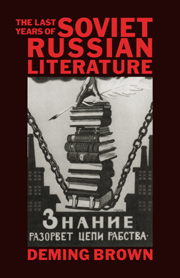Book contents
- Frontmatter
- Contents
- Preface
- Acknowledgments
- 1 The literary situation: publication, genres, criticism
- 2 From “stagnation” to “openness”
- 3 Retrospective writing about the Stalin period
- 4 Village prose: its peak and decline
- 5 The “forty-year-olds”
- 6 Other voices
- 7 “Tough” and “cruel” prose
- 8 New faces
- 9 Conclusion
- Notes
- Select bibliography
- English translations of Soviet Russian prose
- Index
2 - From “stagnation” to “openness”
Published online by Cambridge University Press: 13 October 2009
- Frontmatter
- Contents
- Preface
- Acknowledgments
- 1 The literary situation: publication, genres, criticism
- 2 From “stagnation” to “openness”
- 3 Retrospective writing about the Stalin period
- 4 Village prose: its peak and decline
- 5 The “forty-year-olds”
- 6 Other voices
- 7 “Tough” and “cruel” prose
- 8 New faces
- 9 Conclusion
- Notes
- Select bibliography
- English translations of Soviet Russian prose
- Index
Summary
It has been customary for Western commentators to discuss Soviet literature in terms of stages corresponding, roughly, to political developments within the former USSR. In accordance with this scheme, the stages represented by the present study would be (1) the so-called period of “stagnation” (zastoi) in the 1970s and early 1980s and (2) the period of “openness” (glasnosť) that began when Mikhail Gorbachev came to power. The outer boundaries of the study would be the period of the Thaw, corresponding, more or less, to the Khrushchev years and ending in the 1960s, and the collapse of the Soviet regime, in 1991.
Soviet Russian literature has indeed been sensitive to, and often governed by, political and ideological trends, and the period presently under consideration was, of course, no exception. Despite this fact, forces intrinsic to the literary process itself, and independent of extra-literary influences, were at work, as they always are to a certain degree. Although literature did undergo a time of severe doldrums under the heavy blows dealt to it by the Brezhnev regime, the strength it had acquired during the previous period largely survived the crackdown. Much of this strength remained covert until 1985, as writers either failed to publish their best and most sensitive works or published selectively and with great caution, protecting their talents and surviving by playing it safe.
- Type
- Chapter
- Information
- The Last Years of Soviet Russian LiteratureProse Fiction 1975–1991, pp. 19 - 61Publisher: Cambridge University PressPrint publication year: 1993



